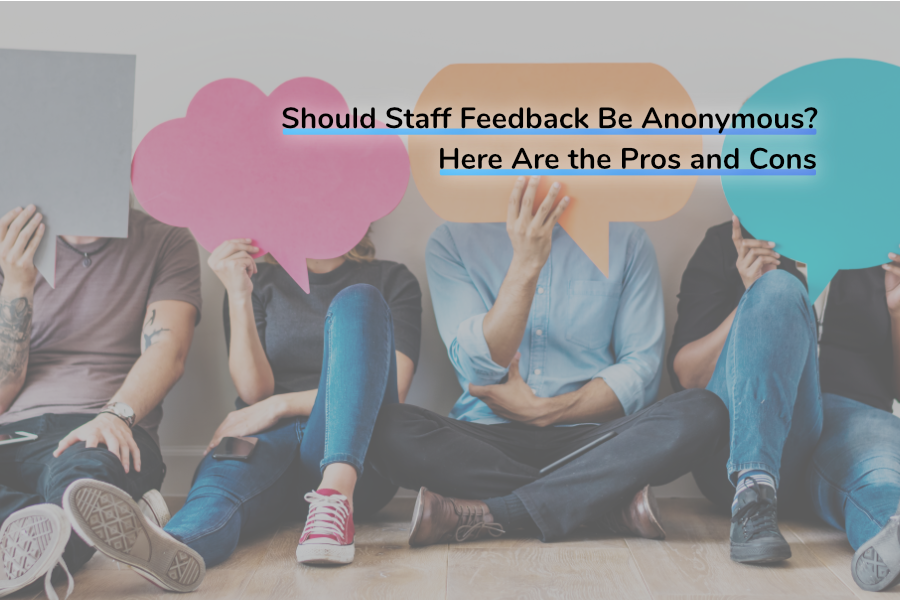The benefits of regular employee feedback are well established. Understanding how your staff feel about company culture, business processes, and how their role plays a part in the wider organisation is vital to an engaged workforce, and ultimately leads to higher business performance.
Sharing frequent polls and surveys is a good way of capturing important insights into employee sentiment. It gives staff an arena to voice their concerns, and helps managers address any pain points before they turn into major blockers. But how do you know that the feedback you’re receiving is the real picture? Some staff are fearful of sharing criticism in case it leads to negative repercussions, and so they may skew their response to be more favourable, or not leave feedback at all. And if the feedback isn’t honest, it’s not helpful.
One way to avoid this problem is to collect feedback anonymously. Anonymous staff feedback hides people’s identity, allowing them to express their thoughts and feelings without fear of negative consequences. But as ideal as this may sound, allowing anonymity comes with its own issues. We explore the pros and cons of anonymous feedback:
What are the pros of anonymous feedback?

Increased honesty
The main benefit of anonymous feedback is that it gives staff the freedom to share their true opinions. This will give managers more honest and helpful insights into important factors such as leadership, company culture, and business practices. With this data, managers can spot trends more accurately and create an action plan for improvement.
Higher participation rates
Often, it’s the same people who speak up when there’s a problem. This can lead to biased feedback where only one side of the story is ever told. Anonymity levels the playing field, giving people who wouldn’t normally share their thoughts the opportunity to participate.
Ensures confidentiality
Some feedback may be of a sensitive nature, whether it’s from a team member who’s experienced negativity at work, or from someone who doesn’t feel supported by management. Anonymous feedback protects identifying characteristics and keeps information confidential, whilst still allowing people to share their experiences.
What are the cons of anonymous feedback?

It’s a one-way conversation
When feedback is left anonymously, the conversation ends there. Thoughts and feelings are shared, but there is no opportunity for managers to remedy the situation directly with their staff. This is one of the major downsides of not putting names to comments. Some feedback may only relate to specific departments, but without context, managers face the difficult choice between making sweeping changes across the company or taking no action at all.
Generates unproductive comments
With hidden identities comes great responsibility, and unfortunately, some may use anonymity as a chance to rant and rave without being constructive. Not to be confused with negative feedback – which can be extremely insightful and useful – feedback that focuses only on being critical and confrontational is unproductive. There’s a risk that keeping names private would fuel this attitude.
Could create a culture of distrust
You could argue that allowing anonymous feedback sets a precedent that it’s risky for staff to share their opinions, whether that’s the reality or not. Some may be sceptical that the feedback they leave will be truly anonymous (even when feedback survey software guarantees it), which could lead to a culture of distrust.
Should staff feedback be anonymous?

It depends. There’s a strong case for and against allowing anonymous feedback, and what’s right for one company will be wrong for another. It also depends on the questions you’re asking. In some cases, feedback calls for anonymity, and in others, transparency is the order of the day.
Feedback survey software that allows you to switch anonymous mode off or on gives you the flexibility to adapt your feedback process. This avoids an “all or nothing” approach to feedback gathering, where you can instead tailor the process for each survey. Consider sharing guidelines on your online intranet software about what constitutes helpful feedback as well, to encourage staff to be mindful and thoughtful when leaving anonymous comments. Finally, reassure staff that whatever feedback they leave – positive or negative – it will be treated fairly and confidentially, whether their identity is hidden or not.





